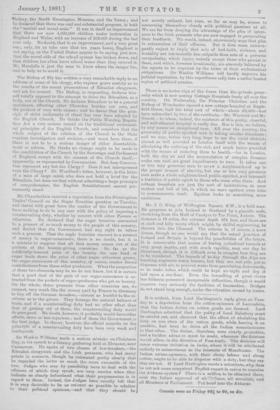The Bishop of Ely has written a very remarkable reply
to an address of some of his clergy, who express grave anxiety as to the results of the recent prosecutions of Ritualist cleigyinen, and ask for counsel. The Bishop, in responding, declares him- self totally opposed to the attempt to drive the Ritualists, as a body, out of the Church. lie declares Ritualism to be a general movement, affecting other Churches besides our own, and the product of very wide causes; and he denies that the prin- ciple of strict uniformity of ritual has over been adopted by the English Church. He thinks the Public Worship Regula- tion Act a very serious inroad on the traditional ecclesiasti- cal principles of the English Church, and considers that the whole subject of- the relation of the Church to the State requires investigation and revision,—and must have them, if there is not to be a serious danger of either disestablish- xnent or schism. He thinks no change ought to be made in the constitution of the Church by the Sovereign and Parliament of England, except with the consent of the Church itself,— apparently, as represented by Convocation. But does Convoca- tion represent any but the Clergy P Does it not misrepresent even the Clergy P Dr. Woodford's letter, however, is the letter of a man of large mind, who does not hold a brief for the Ritualists, but does see that without admitting a large principle of comprehension, the English Establishment cannot per- manently stand.














































 Previous page
Previous page